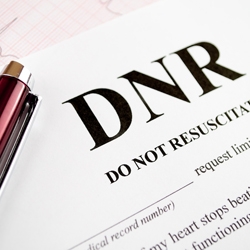 Aside from the controversy surrounding the Liverpool Care Pathway, managing end of life care can be a difficult process for junior doctors.
Aside from the controversy surrounding the Liverpool Care Pathway, managing end of life care can be a difficult process for junior doctors.
JuniorDr’s Laura James asks Dr Vincent Crosby, palliative medicine consultant at Nottingham University Hospitals NHS Trust, for his advice.
HAVE YOU GOT ANY SUGGESTIONS ON COMMUNICATION WHEN TALKING TO FAMILIES OF THOSE WHO ARE DYING?
I think it’s approaching the communication in a way that you would want someone to speak to you, if you were in that situation. When people come into hospital and they’ve deteriorated quickly, the family need to know that we’ll firstly see if there is a reversible cause for the persons deterioration and if there is we will do what we can to improve things.
I think it’s really important at that stage to always sew the seed that there may not be a reversible cause. It may be that we are approaching the end of life and I think it’s important for us to try to be open and explicit with the family and say we will try what we can do but there is a risk that your mum or dad might die during this episode. If whatever we’re doing isn’t working then our focus would be on keeping them comfortable and making sure that they’re not suffering.
There’s a useful phrase that says, “we can hope for the best, but fear the worst”. That gives people that feeling that we’ll try and do what we can but we can’t promise that they’ll definitely get better.
What do you think is the most difficult part of the Liverpool Care Pathway?
I think it’s really important at that stage to always sew the seed that there may not be a reversible cause. It may be that we are approaching the end of life and I think it’s important for us to try to be open and explicit with the family and say we will try what we can do but there is a risk that your mum or dad might die during this episode. If whatever we’re doing isn’t working then our focus would be on keeping them comfortable and making sure that they’re not suffering.
The more experience you get and the longer you ve been working in medicine, the better you become at it. But we’re not perfect and we will think that people are reaching the end of their life, put them on the pathway and they’ll survive.
I think one of the worst things you can do is be very black and white and give the impression that this will definitely happen, because then if it doesn’t, it can come back and haunt you. The hardest bit without a doubt is communication – expressing that ambiguity; that uncertainty to families.
In what sort of scenario would we think about referring to palliative care?
End of life care should be everybody’s business and we should all be able to do the basics. However, if patient’s families are struggling to accept the opinion that a patient is dying it might be an indication to get a second opinion from a palliative care team. I do however think that for the majority of patients who die on standard medical wards the clinical teams should have the skills and abilities to look after them.
What further self-learning opportunities would you suggest for junior doctors?
There are certainly plenty of resources online and lots of training available. I’d recommend that everybody post F1, after they’ve encountered some difficult situations, seeks out a communication skills training course and refreshes everything they learnt in medical school.
Is there anything you think that doctors could have done better?
I think most, if not all, of the doctors I’ve come across want to do a good job and do the best for all of the patients they come into contact with. There’s natural variation in how far people go sometimes with tests and with treatment, which will vary from doctor to doctor.
It’s making sure that doctors who are perhaps more interventional in their treatment are constantly challenging themselves to think – is pursuing these extra tests beneficial? Does adding in these extra treatments make care better for the patient? This patient looks like they’re dying, but have I thought about every reversible cause? Have I done everything that I possibly can to make sure that this patient is improving?
So I think it’s about all doctors constantly evaluating their own practice in end of life care and striving to improve them.




